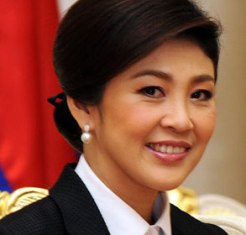By Apolinari Tairo
Published August 6, 2013
 Thailand, the biggest trophy market in South East Asia, has pledged to support Tanzania to fight poaching of the African elephant and the black rhino, the most threatened mammal species in Africa.
Thailand, the biggest trophy market in South East Asia, has pledged to support Tanzania to fight poaching of the African elephant and the black rhino, the most threatened mammal species in Africa.
Khamis Suedi Kagasheki, Tanzania’s Minister for Natural Resources and Tourism, says a deal has been signed where Thailand will help Tanzania to fight against poaching syndicates operating in Asia and the Far East.
Kagasheki said Yingluck Shinawatra, the Premier of Thailand who concluded a three-day official tour of Tanzania, had signed four memoranda of understanding between the two nations two of which focused on National parks and Wildlife management shortly before she left the East African country.
Despite the expected support and technical assistance to Tanzania, Thailand remains a notorious market and transit route for bloody ivory from the African continent where elephants are threatened by extinction.
The Black African rhinoceros is on the brink of extinction, though a few remain under high protection in South Africa, Botswana, Zimbabwe, Namibia, Tanzania and Kenya.
The rhino horn is the most expensive wildlife product, with a kilogramme of it fetching up to US$10,000 in East Asian markets. Thailand stands as the biggest black market for the bloody ivory from East Africa, while the rhino horn from the African rhinoceros is sold expensively in the capital, Bangkok.
The Convention on International Trade in Endangered Species of Wild Fauna and Flora (CITES) says the average cost per kilogramme of an African rhino horn has averaged U$10,000 over the past few years. The average value of each horn was US$80,000 over the past two decades.
Philippines, Vietnam, Taiwan, Singapore and Hong Kong are other notorious black markets for bloody ivory from the African elephants and the black rhino horn.
Reacting to Premier Shinawatra’s official tour to Tanzania and her daylong visit to Serengeti National Park in northern Tanzania, the Tanzania Country Office of the World Wide Fund (WWF), jointly with its global network, had released a statement to both Thailand and Tanzania, urging the two countries to spearhead conservation of wildlife for mutual benefits of their people and ensuring sound management of natural resources.
The statement issued and signed by the WWF Country Director Bell Aube Houinato shortly before official departure of Shinawatra, said the global nature conservation body recognises,appreciates and congratulates the president of Tanzania, Jakaya Mrisho Kikwete and Madam Yingluck Shinawatra, Prime Minister of Thailand, upon signing a Memorandum of Understanding on Cooperation in Wildlife Conservation and Management between the Government of the Kingdom of Thailand and the Government of the United Republic of Tanzania.
“In particular WWF recognizes and appreciates the president of Tanzania, Mr Jakaya Mrisho Kikwete, for his steadfast commitment in the fight against illegal wildlife trade in Tanzania and Ms Yingluck Shinawatra, Prime Minister of Thailand for her recently announced intention to ban domestic ivory trade in Thailand at the opening of the 16th Meeting of the Conference of the Parties to the Convention on International Trade in Endangered Species of Wild Fauna and Flora(CITES),†reads part of the WWF statement. “Your Excellence contributions form the basis for the protection and restoration of the country’s and indeed planet’s important species while also being saved from extinction.”
The statement further noted that it was heartening to see such South-South Cooperation and the resolve of respective governments, ministries, who are at the forefront in confronting this dangerous trade, in taking such decisive and exemplary action both on the supply and demand sides of this atrocious illegal trade.
“WWF and its partner conservation organizations support you in this endeavor,” concluded the statement.
 Other than four cooperation documents, the Thai Prime Minister had signed, her official tour to Tanzania still remains somehow, confidential because the media were not well involved, neither was a joint communiqué issued nor a joint press conference organised.
Other than four cooperation documents, the Thai Prime Minister had signed, her official tour to Tanzania still remains somehow, confidential because the media were not well involved, neither was a joint communiqué issued nor a joint press conference organised.
But, wildlife conservation observers think the tour was partly pushed by the recent visit to Tanzania of the USA president Barack Obama who openly declared the American position to combat crime on poaching of African fauna.
Other than signing the White House Presidential Executive Order that centered on protection of the African wildlife, Obama said his administration would put new energy and funds into fighting wildlife trafficking, describing it as an international crisis that continues to escalate.
An eTurboNews article





